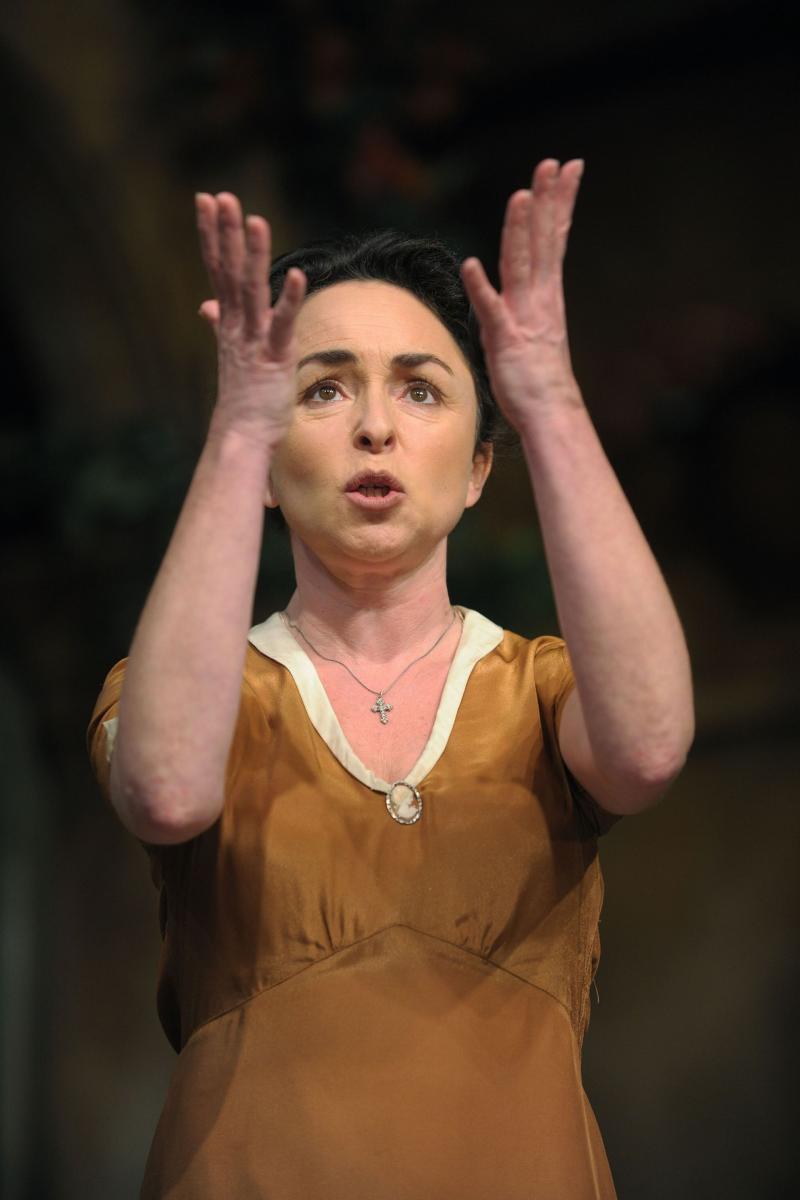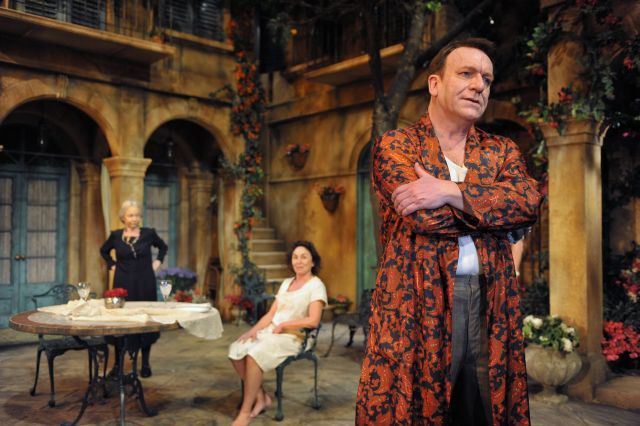Filumena, Almeida Theatre | reviews, news & interviews
Filumena, Almeida Theatre
Filumena, Almeida Theatre
Samantha Spiro follows where Judi Dench and Joan Plowright previously led in Italian theatrical mainstay

If it's possible to take a loving and empathic approach to decidedly intractable material, the director Michael Attenborough achieves precisely that with Filumena, in which Samantha Spiro follows on from (and surpasses) Judi Dench in author Eduardo De Filippo's title role of the one-time Neapolitan prostitute who in early middle age decides that what matters most is to be una mamma.
A major success back in the 1970s for Joan Plowright in a Franco Zeffirelli staging that remains the stuff of legend, Filumena is most accurately described as a caprice, and one can imagine Italians taking to il cuore a protracted fable, first seen in 1946, about a fragmented family made whole that comes accompanied by the necessary shedding of tears to seal the deal. The problem, though, is that for a good two-thirds of the (brief) action, the prevailing tone is one of sniping and spitefulness, especially in the Almeida's new English version from Tanya Ronder that plays up the potential for violence. (On at least two occasions, one character talks of killing another.)
It would help if De Filippo actually dramatised the events and shifts in emotion that he describes
Talking of "the things I've been holding in here", Spiro unexpectedly puts one in mind of a different stage mother - Momma Rose in the musical Gypsy - and her regard for the wealthy, older Domenico Soriano (Clive Wood) whom she ends the play marrying seems so antagonistic for so much of the time that the two would seem to be well on their way to a relationship by way of Strindberg or Edward Albee, not the communal hug-in with which events conclude.
 It would help if De Filippo actually dramatised the events and shifts in emotion that he describes. As it is, one becomes aware early on of the volume of activity that is reported rather than shown, starting with Filumena faking her own death all the way through to a dramatic about-face from Wood's Domenico, a robust, craggy figure (pictured above right on Robert Jones's holiday-worthy set) who seems to have found his way to southern Italy by way of a Ted Hughes poem. (Or a Brando film: reminding onlookers of the degree to which he was once a contender, he sounds like a refugee from On the Waterfront.) And just as the illiterate Filumena's whoring past has to some extent to be taken on faith (the woman we see at the outset is such a scold that one can't imagine clients queuing up for her company), her maid Rosalia (an ever-impish Sheila Reid) gets a backstory of her own, which turns out to chime with Filumena's even as we are left wanting the drama to unfold in front of us for a change.
It would help if De Filippo actually dramatised the events and shifts in emotion that he describes. As it is, one becomes aware early on of the volume of activity that is reported rather than shown, starting with Filumena faking her own death all the way through to a dramatic about-face from Wood's Domenico, a robust, craggy figure (pictured above right on Robert Jones's holiday-worthy set) who seems to have found his way to southern Italy by way of a Ted Hughes poem. (Or a Brando film: reminding onlookers of the degree to which he was once a contender, he sounds like a refugee from On the Waterfront.) And just as the illiterate Filumena's whoring past has to some extent to be taken on faith (the woman we see at the outset is such a scold that one can't imagine clients queuing up for her company), her maid Rosalia (an ever-impish Sheila Reid) gets a backstory of her own, which turns out to chime with Filumena's even as we are left wanting the drama to unfold in front of us for a change.
As it is, we look on as Filumena assembles her three grown sons, all with different fathers, who have barely gathered amid the bougainvillea before they, too, are having a go at one another with gloves-off abandon. But scarcely has Domenico denounced this "newly formed tribe" and watched as Filumena packs her bags before 10 months elapse, marriage is back on the cards, and Domenico is busy trying to determine just which one of these lads might actually be his, a plot twist that a half-century later would be revisited (and inverted) in Mamma Mia!, which, come to think of it, might be a good alternative title for this play.
And yet, there's no denying the vivid cut-and-thrust of Attenborough's production, which may have been intended as a riposte to the Almeida's previous tenant, The House of Bernarda Alba, a play about a woman who destroys her family by contrast with Filumena, who wants to build her family anew. Luke Norris, Richard Riddell and Brodie Ross do exceptionally well in the jokily conceived parts of the sons, and their simultaneously spoken "yes dad" near the end is both funny and unexpectedly sweet.
Spiro throughout is a marvel, whether knitting her brow into an assault weapon that one imagines has sustained this true survivor through many a hard time or blossoming, in accordance with the surrounding foliage, as her long-awaited nuptials finally loom. (Typically, though, even that part of the play is left in the wings.) And when the dry-eyed Filumena finally allows her tear ducts to open, well, I can report from where I was sitting that she wasn't the only one.
- Filumena is at the Almeida Theatre until 12 May
rating
Explore topics
Share this article
The future of Arts Journalism
You can stop theartsdesk.com closing!
We urgently need financing to survive. Our fundraising drive has thus far raised £49,000 but we need to reach £100,000 or we will be forced to close. Please contribute here: https://gofund.me/c3f6033d
And if you can forward this information to anyone who might assist, we’d be grateful.

Subscribe to theartsdesk.com
Thank you for continuing to read our work on theartsdesk.com. For unlimited access to every article in its entirety, including our archive of more than 15,000 pieces, we're asking for £5 per month or £40 per year. We feel it's a very good deal, and hope you do too.
To take a subscription now simply click here.
And if you're looking for that extra gift for a friend or family member, why not treat them to a theartsdesk.com gift subscription?
more Theatre
 Othello, Theatre Royal, Haymarket review - a surprising mix of stateliness and ironic humour
David Harewood and Toby Jones at odds
Othello, Theatre Royal, Haymarket review - a surprising mix of stateliness and ironic humour
David Harewood and Toby Jones at odds
 Macbeth, RSC, Stratford review - Glaswegian gangs and ghoulies prove gripping
Sam Heughan's Macbeth cannot quite find a home in a mobster pub
Macbeth, RSC, Stratford review - Glaswegian gangs and ghoulies prove gripping
Sam Heughan's Macbeth cannot quite find a home in a mobster pub
 The Line of Beauty, Almeida Theatre review - the 80s revisited in theatrically ravishing form
Alan Hollinghurst novel is cunningly filleted, very finely acted
The Line of Beauty, Almeida Theatre review - the 80s revisited in theatrically ravishing form
Alan Hollinghurst novel is cunningly filleted, very finely acted
 Wendy & Peter Pan, Barbican Theatre review - mixed bag of panto and comic play, turned up to 11
The RSC adaptation is aimed at children, though all will thrill to its spectacle
Wendy & Peter Pan, Barbican Theatre review - mixed bag of panto and comic play, turned up to 11
The RSC adaptation is aimed at children, though all will thrill to its spectacle
 Hedda, Orange Tree Theatre review - a monument reimagined, perhaps even improved
Scandinavian masterpiece transplanted into a London reeling from the ravages of war
Hedda, Orange Tree Theatre review - a monument reimagined, perhaps even improved
Scandinavian masterpiece transplanted into a London reeling from the ravages of war
 The Assembled Parties, Hampstead review - a rarity, a well-made play delivered straight
Witty but poignant tribute to the strength of family ties as all around disintegrates
The Assembled Parties, Hampstead review - a rarity, a well-made play delivered straight
Witty but poignant tribute to the strength of family ties as all around disintegrates
 Mary Page Marlowe, Old Vic review - a starry portrait of a splintered life
Tracy Letts's Off Broadway play makes a shimmeringly powerful London debut
Mary Page Marlowe, Old Vic review - a starry portrait of a splintered life
Tracy Letts's Off Broadway play makes a shimmeringly powerful London debut
 Little Brother, Soho Theatre review - light, bright but emotionally true
This Verity Bargate Award-winning dramedy is entertaining as well as thought provoking
Little Brother, Soho Theatre review - light, bright but emotionally true
This Verity Bargate Award-winning dramedy is entertaining as well as thought provoking
 The Unbelievers, Royal Court Theatre - grimly compelling, powerfully performed
Nick Payne's new play is amongst his best
The Unbelievers, Royal Court Theatre - grimly compelling, powerfully performed
Nick Payne's new play is amongst his best
 The Maids, Donmar Warehouse review - vibrant cast lost in a spectacular-looking fever dream
Kip Williams revises Genet, with little gained in the update except eye-popping visuals
The Maids, Donmar Warehouse review - vibrant cast lost in a spectacular-looking fever dream
Kip Williams revises Genet, with little gained in the update except eye-popping visuals
 Ragdoll, Jermyn Street Theatre review - compelling and emotionally truthful
Katherine Moar returns with a Patty Hearst-inspired follow up to her debut hit 'Farm Hall'
Ragdoll, Jermyn Street Theatre review - compelling and emotionally truthful
Katherine Moar returns with a Patty Hearst-inspired follow up to her debut hit 'Farm Hall'
 Troilus and Cressida, Globe Theatre review - a 'problem play' with added problems
Raucous and carnivalesque, but also ugly and incomprehensible
Troilus and Cressida, Globe Theatre review - a 'problem play' with added problems
Raucous and carnivalesque, but also ugly and incomprehensible

Add comment